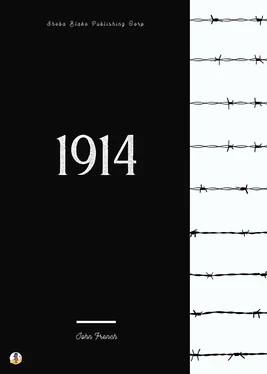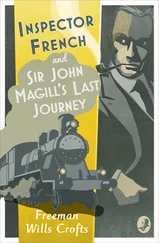John French - 1914
Здесь есть возможность читать онлайн «John French - 1914» — ознакомительный отрывок электронной книги совершенно бесплатно, а после прочтения отрывка купить полную версию. В некоторых случаях можно слушать аудио, скачать через торрент в формате fb2 и присутствует краткое содержание. Жанр: unrecognised, на английском языке. Описание произведения, (предисловие) а так же отзывы посетителей доступны на портале библиотеки ЛибКат.
- Название:1914
- Автор:
- Жанр:
- Год:неизвестен
- ISBN:нет данных
- Рейтинг книги:3 / 5. Голосов: 1
-
Избранное:Добавить в избранное
- Отзывы:
-
Ваша оценка:
- 60
- 1
- 2
- 3
- 4
- 5
1914: краткое содержание, описание и аннотация
Предлагаем к чтению аннотацию, описание, краткое содержание или предисловие (зависит от того, что написал сам автор книги «1914»). Если вы не нашли необходимую информацию о книге — напишите в комментариях, мы постараемся отыскать её.
1914 — читать онлайн ознакомительный отрывок
Ниже представлен текст книги, разбитый по страницам. Система сохранения места последней прочитанной страницы, позволяет с удобством читать онлайн бесплатно книгу «1914», без необходимости каждый раз заново искать на чём Вы остановились. Поставьте закладку, и сможете в любой момент перейти на страницу, на которой закончили чтение.
Интервал:
Закладка:
His manner was courteous in the extreme; but he showed inflexible firmness and determination.
His Staff were of the pattern of French cavalry officers. I have seen much of them for years past at manoeuvres, etc., and they combine the best qualities of cavalry leaders with the utmost camaraderie and good fellowship.
I interviewed the General at some length, pointing out what I had been told by General Joffre and his Chief of Staff, namely, that the Cavalry Corps had been directed to operate on my left or outer flank. I informed him that in my opinion this was the point where his presence was chiefly required, and where his action would be most effective in checking the advance of the enemy. I told the General that I should be very glad of his help in that locality as soon as possible, because in my present forward position, and having regard to the continued retirement of the 5th French Army, I should sorely need all the assistance I could get to establish the Army under my command in their new position.
General Sordet was very courteous and sympathetic. He expressed the utmost desire to help me in every possible way. He added that he had received no orders to move to the left flank and must, therefore, await these instructions before he could march. He further told me that after the arduous time he had experienced when supporting the Belgian Army, his horses stood in the most urgent need of rest, and that, in any case, it would be impossible for him to leave his present position for at least 24 hours. He promised, however, to do all in his power to help me, and, as my story will presently show, he kept his word splendidly.
I then went back to Le Cateau to pick up any messages or news from Joffre or Lanrezac. Here I was gladdened by the sight of the detrainment of the advanced troops of the 4th Division (General Snow).
After a brief halt at Le Cateau, I started again for my advanced Headquarters at Bavai. The experiences of that afternoon remain indelibly impressed on my memory. Very shortly after leaving Le Cateau I was met by streams of Belgian refugees, flying from Mons and its neighbourhood. They were lying about the fields in all directions, and blocking the roads with carts and vans in which they were trying to carry off as much of their worldly goods as possible. The whole country-side showed those concrete evidences of disturbance and alarm which brought home to all our minds what this retreat meant and all that it might come to mean.
After much delay from these causes I reached Bavai about 2.30 p.m., and it was with great difficulty that my motor could wind its way through the mass of carts, horses, fugitives and military baggage trains which literally covered almost every yard of space in the small town. The temporary advanced Headquarters were established in the market place, the appearance of which defies description. The babel of voices, the crying of women and children, mingled with the roar of the guns and the not far distant crack of rifles and machine guns, made a deafening noise, amidst which it was most difficult to keep a clear eye and tight grip on the rapidly changing course of events.
In a close room on the upper floor of the Mairie I found Murray, my Chief of Staff, working hard, minus belt, coat and collar. The heat was intense. The room was filled with Staff Officers bringing reports or awaiting instructions. Some of the Headquarters Staff had not closed their eyes for 48 hours, and were stretched out on forms or huddled up in corners, wrapped in that deep slumber which only comes to brains which, for the time being, are completely worn out.
If some of the armchair critics who so glibly talk of the easy time which Staff Officers, compared with their regimental comrades, have in war—if some of them could have watched that scene, they would be more chary of forming such opinions and spreading such wrong ideas.
Personally, I have always been far more a regimental than a Staff Officer, and I have every reason to sympathise with the former, but when I have witnessed scenes and gone through days such as I am now very imperfectly describing, and when I know such days to be frequent and long drawn out occurrences in war, it makes my blood boil to hear and to read of the calumnies which are often heaped upon the head of the unfortunate “Staff.”
Murray did splendid work that day and set the best of examples. On my arrival at Bavai he reported the situation fully and clearly to me. The action of the cavalry and the 19th Brigade on the left had greatly relieved the heavy pressure on the 5th Division, and the retirement was proceeding fairly well.
Information had, however, reached me of the defeat and retreat of the 3rd French Army, and the continued falling back of Lanrezac. I judged also, by the method and direction of the attack, that strenuous attempts were being made to turn our left flank and press me back on Maubeuge. The force opposed to me was growing in size, and I judged it to be more than double my numbers. As subsequent information proved, we were actually opposed by four corps and at least two cavalry divisions.
Early in the afternoon it was clear to me that further definite decisions must be taken. We could not stand on the line towards which the troops were now retiring.
The fortress of Maubeuge lay close on my right rear. It was well fortified and provisioned. It is impossible for anyone, who has not been situated as I was, to realise the terrible temptation which such a place offers to an army seeking shelter against overpowering odds.
For a short time on this fateful afternoon I debated within myself whether or not I should yield to this temptation; but I did not hesitate long, because there were two considerations which forced themselves prominently upon my mind.
In the first place, I had an instinctive feeling that this was exactly what the enemy was trying to make me do; and, in the second place, I had the example of Bazaine and Metz in 1870 present in my mind, and the words of Sir Edward Hamley’s able comment upon the decision of the French Marshal came upon me with overwhelming force. Hamley described it as “The anxiety of the temporising mind which prefers postponement of a crisis to vigorous enterprise.” Of Bazaine he says, “In clinging to Metz he acted like one who, when the ship is foundering, should lay hold of the anchor.”
I therefore abandoned all such ideas, and issued orders at about 3 p.m. directing the retreat some miles further back to the line Le Cateau—Cambrai.
The pressure of the enemy on our left flank became greater towards night. All reports and reconnaissances indicated a determined attempt to outflank us and cut across our line of retreat, but Allenby’s cavalry was splendidly disposed and handled. The German columns were kept at bay, and the troops bivouacked generally on a line somewhat south of that towards which they had been ordered to retreat in the morning. There was some confusion in the retirement of the 2nd Corps. The 5th Division crossed the rear of the 3rd near Bavai, got to the east of them and somewhat on the line of the retreat of the 1st Corps, whose movement was thus hampered and delayed.
I got back to Headquarters at Le Cateau late in the evening, where a budget of reports awaited me. The most important news was contained in a telephone message received at 9.40 p.m. from Major Clive of the Grenadier Guards, who was my liaison officer at French Headquarters. This ran as follows:—
“The 4th Army, fighting against an enemy estimated at three Corps, has fallen back to the line Virton—Spincourt. Three Reserve Divisions made a counter-attack this afternoon from the south against the enemy’s left flank. The 3rd Army, fighting in difficult country, has fallen back to better ground this side of the Meuse, about Mézières and Stenai. The enemy have been unable to cross the Meuse. The 3rd Army is waiting for sufficient strength to make a counter-attack from its right. The 1st Corps of the 5th Army found that the Germans had crossed the Meuse behind them south of Dinant; they therefore fell back to the neighbourhood of Givet and Philippeville.”
Читать дальшеИнтервал:
Закладка:
Похожие книги на «1914»
Представляем Вашему вниманию похожие книги на «1914» списком для выбора. Мы отобрали схожую по названию и смыслу литературу в надежде предоставить читателям больше вариантов отыскать новые, интересные, ещё непрочитанные произведения.
Обсуждение, отзывы о книге «1914» и просто собственные мнения читателей. Оставьте ваши комментарии, напишите, что Вы думаете о произведении, его смысле или главных героях. Укажите что конкретно понравилось, а что нет, и почему Вы так считаете.












